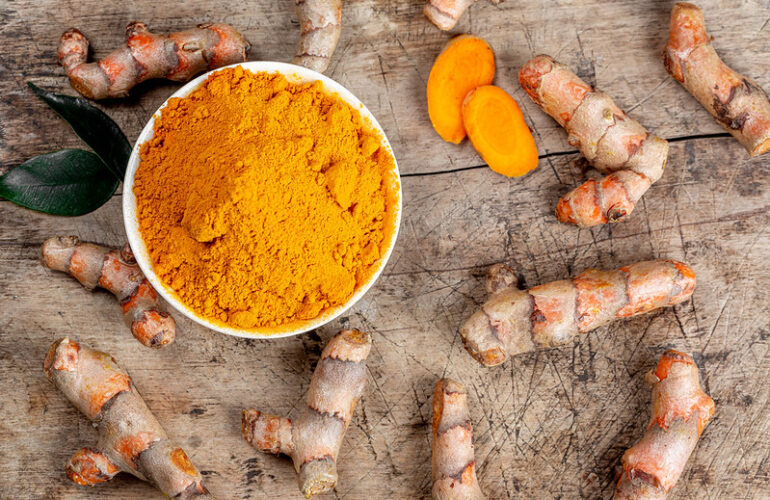Identification
Turmeric is a plant that is known for its bright yellow-orange root, which is used as a spice in cooking and for medicinal purposes. Here are some steps to help you identify a turmeric plant:
- Look for a plant with large green leaves that are approximately 3-4 feet tall. Turmeric leaves are oblong or lance-shaped with a smooth surface and distinct midrib.
- Check the soil around the plant. Turmeric plants prefer well-drained, fertile soil with plenty of organic matter.
- Look for a rhizome, which is part of the plant that is used for medicinal and culinary purposes. The rhizome of a turmeric plant is bright yellow-orange and has a cylindrical shape. It looks similar to ginger root but with a brighter color.
- Look for flowers, which are small and pink or white in color. However, turmeric plants do not always produce flowers, so the presence of flowers is not a reliable way to identify the plant.
Overall, the easiest way to identify a turmeric plant is by looking for its distinct bright yellow-orange rhizome, which is the most recognizable part of the plant.
Below are some of the parts of the Turmeric plant that are commonly used for medicinal purposes:
- Rhizomes – The rhizomes of the Turmeric plant are the most commonly used part for medicinal purposes. They are used to make supplements that are said to have anti-inflammatory and antioxidant properties. Turmeric supplements are often used to treat conditions such as arthritis, heart disease, and Alzheimer’s disease.
- Leaves – The leaves of the Turmeric plant are also used for medicinal purposes, although less commonly than the rhizomes. They are used to make teas that are said to have anti-inflammatory and pain-relieving properties.
- Flowers – The flowers of the Turmeric plant are sometimes used for medicinal purposes. They are used to make teas or tinctures that are said to have anti-inflammatory and antioxidant properties.
Common Name
Turmeric
Scientific Name
Curcuma longa
Name in popular languages
- Arabic: Kourkoum
- French: Curcuma
- German: Kurkuma
- Spanish: Cúrcuma
- Italian: Curcuma
- Chinese: Jiang Huang
- Japanese: Ukon
- Korean: Yuksaeng
- Thai: Khamin Chan
- Hindi: Haldi
- Tamil: Manjal
- Telugu: Pasupu
- Kannada: Arishina
- Malayalam: Manjal
- Bengali: Halud
- Punjabi: Haldi
- Gujarati: Haldi
- Urdu: Haldi
Origin and History
Turmeric is native to South Asia, particularly India, and has been used for thousands of years in traditional medicine and cooking. The history of its usage for health and medicinal purposes can be traced back to the Vedic culture in India, where it was used as a medicinal herb and for religious rituals.
In Ayurvedic medicine, turmeric was used to treat a variety of ailments, including digestive issues, respiratory problems, and skin diseases. It was also used as a general tonic to promote overall health and well-being. In traditional Chinese medicine, turmeric was used to promote blood circulation and treat conditions such as menstrual pain and bruising.
Turmeric has been used as a spice in cooking for centuries, particularly in South Asian cuisine. It is a key ingredient in many curries and other dishes, and is prized for its distinctive flavor and bright yellow color.
In recent years, research has uncovered a range of potential health benefits associated with turmeric, including its anti-inflammatory, antioxidant, and antimicrobial properties. Studies have suggested that turmeric may have potential in treating or preventing a range of conditions, including Alzheimer’s disease, cancer, and heart disease.
Overall, the long history of turmeric usage in traditional medicine and cooking, combined with modern scientific research, has cemented its reputation as a versatile and health-promoting spice.
Nutritional constituents
Turmeric contains a range of beneficial nutritional constituents. Some of the key nutritional constituents of turmeric include:
- Curcuminoids: The most well-known nutritional constituent of turmeric is curcuminoids, a group of compounds that include curcumin, demethoxycurcumin, and bisdemethoxycurcumin. Curcuminoids are known for their antioxidant and anti-inflammatory properties, and they have been linked to a range of health benefits, including improved cognitive function, reduced risk of heart disease, and reduced inflammation.
- Essential oils: Turmeric also contains essential oils, including turmerone, atlantone, and zingiberene. These oils are responsible for the distinctive aroma and flavor of turmeric and have been linked to a range of health benefits, including improved digestion and reduced inflammation.
- Fiber: Turmeric is a good source of dietary fiber, which is important for maintaining digestive health and reducing the risk of heart disease and other chronic conditions.
- Vitamins and minerals: Turmeric is a good source of vitamins and minerals, including vitamin C, vitamin E, vitamin K, and calcium. These nutrients are important for maintaining overall health and reducing the risk of chronic disease.
- Carbohydrates: Turmeric contains carbohydrates, which provide the body with energy and support brain function.
Overall, turmeric is a nutrient-rich spice that contains a range of beneficial compounds that can help support overall health and well-being.
Medicinal or Health Benefits
Turmeric has been used for centuries in traditional medicine and is known for its wide range of potential health benefits. Here are some of the key medicinal or health benefits of turmeric:
- Anti-inflammatory properties: Curcumin, the active ingredient in turmeric, has been shown to have strong anti-inflammatory properties. It can help reduce inflammation in the body, which is believed to be a key factor in many chronic diseases, including cancer, heart disease, and Alzheimer’s disease.
- Antioxidant properties: Turmeric is a potent antioxidant, which means it can help protect the body from damage caused by free radicals. This can help reduce the risk of chronic diseases and slow down the aging process.
- Pain relief: Turmeric has been shown to have pain-relieving properties, particularly for conditions such as arthritis and joint pain.
- Digestive health: Turmeric can help improve digestion and reduce symptoms of digestive issues such as bloating and gas.
- Immune system support: Turmeric has immune-boosting properties and can help support a healthy immune system.
- Brain health: Curcumin has been shown to have neuroprotective properties and may help improve cognitive function and reduce the risk of neurodegenerative diseases such as Alzheimer’s disease.
- Heart health: Turmeric may help reduce the risk of heart disease by improving blood flow, reducing inflammation, and reducing cholesterol levels.
- Skin health: Turmeric has been used in traditional medicine to treat a range of skin conditions, and its antioxidant and anti-inflammatory properties may help improve skin health and reduce the signs of aging.
Overall, turmeric is a versatile and health-promoting spice that can offer a range of potential benefits for both physical and mental health. However, more research is needed to fully understand the extent of its health benefits and to determine the most effective ways to use it for medicinal purposes.
Scientific Perspective
There has been a significant amount of scientific research on the potential health benefits of turmeric, particularly its active ingredient curcumin. Here are some examples of scientific evidence supporting the use of turmeric for health and medicinal purposes:
- Anti-inflammatory properties: Numerous studies have demonstrated the anti-inflammatory properties of curcumin, which may help reduce inflammation in the body and alleviate symptoms of conditions such as arthritis and inflammatory bowel disease. A 2014 review of the scientific literature found that curcumin had a significant anti-inflammatory effect in a variety of conditions.
- Antioxidant properties: Curcumin has been shown to have potent antioxidant properties, which may help protect the body from damage caused by free radicals. A 2017 review of the literature found that curcumin was effective at reducing oxidative stress in a variety of conditions.
- Pain relief: Several studies have suggested that turmeric may have pain-relieving properties, particularly for conditions such as osteoarthritis and rheumatoid arthritis. A 2016 study found that curcumin was effective at reducing pain and improving physical function in patients with knee osteoarthritis.
- Digestive health: Turmeric may have beneficial effects on digestive health, including reducing symptoms of bloating and gas. A 2015 review of the literature found that curcumin was effective at improving symptoms of digestive disorders such as irritable bowel syndrome.
- Brain health: A growing body of research has suggested that curcumin may have neuroprotective properties and may help improve cognitive function and reduce the risk of neurodegenerative diseases such as Alzheimer’s disease. A 2018 study found that curcumin supplementation improved working memory and attention in healthy older adults.
- Heart health: Some studies have suggested that turmeric may have cardioprotective effects, including reducing cholesterol levels and improving blood flow. A 2017 review of the literature found that curcumin may have beneficial effects on various risk factors for heart disease.
Overall, while more research is needed to fully understand the extent of turmeric’s health benefits and the most effective ways to use it for medicinal purposes, the existing scientific evidence suggests that turmeric and its active ingredient curcumin have a range of potential health benefits.
FDA's perspective
The U.S. Food and Drug Administration (FDA) has not approved turmeric or its active ingredient curcumin for the prevention or treatment of any specific medical condition. While turmeric is generally recognized as safe as a food ingredient, the FDA has not evaluated its safety and effectiveness as a drug.
The FDA regulates dietary supplements, which can include turmeric supplements, under a different set of regulations than prescription drugs. Dietary supplements are not intended to treat, diagnose, or cure any disease, and supplement manufacturers are not required to provide evidence of safety and effectiveness before marketing their products. Instead, the FDA relies on post-marketing surveillance to monitor the safety of dietary supplements.
In 2019, the FDA issued warning letters to several companies that were making unsupported health claims about their turmeric products, including claims that they could treat cancer and Alzheimer’s disease. The FDA has also warned consumers about the potential for turmeric supplements to interact with certain medications, including blood thinners and diabetes medications.
While the FDA has not approved turmeric for medicinal purposes, many healthcare providers recognize the potential health benefits of turmeric and may recommend its use in certain situations. As with any supplement or medication, it’s important to talk to your healthcare provider before using turmeric, especially if you are taking other medications or have a medical condition.




